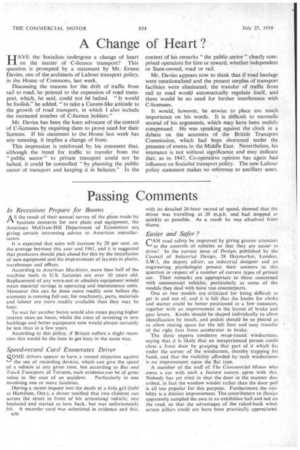A Change of Heart ?
Page 38

If you've noticed an error in this article please click here to report it so we can fix it.
HAVE the Socialists undergone a change of heart on the matter of C-licence transport? This question is prompted by a statement by Mr. Ernest Davies, one of the architects of Labour transport policy, in the House of Commons, last week.
Discussing the reasons for the drift of traffic from rail to road, he pointed to the expansion of road transport, which, he said, could not be. halted. "lit would be foolish," he added, "to take a Canute-like attitude to the growth of road transport, in which I also include the increased number of C-licence holders."
Mr. Davies has been the keen advocate of the control of C-licensees by requiring them to prove need for their licences. If his statement to the House last week has any meaning, it implies a change of front.
This impression is reinforced by his comment that, although the trend for traffic to transfer from the " public sector" to private transport could not be halted, it could be controlled "by planning the public sector of transport and keeping it in balance." In the context of his remarks "the public sector" clearly comprised operators for hire or reward, whether independent or State-owned, road or rail.
Mr. Davies appears now to think that if road haulage were renationalized and the present surplus of transport facilities were eliminated, the transfer of traffic from rail to road would automatically regulate itself, and there would be no need for further interference with C-licensees.
It would, however, be unwise to place too much importance on his words. It is difficult to reconcile several of his arguments, which may have been unduly compressed. He was speaking against the clock in a debate on the accounts of the British Transport Commission, which had been shortened under the pressure of events in the Middle East. Nevertheless, his utterance is not without significance and may indicate that, as in 1947, Co-operative opinion has again had influence on Socialist transport policy. The new Labour policy statement makes no reference to ancillary users.
















































































































